Money
Sign up for my free live masterclass–Take Charge of Your Wealth. It’s based off my session at Brave Enough conference a few weeks ago.
Debt is bad, right? It must be, since so many finance bloggers talk about how you need to pay off debt ASAP. I used to be in this camp too. I used to recommend that doctors should pay off their student loans within 5-10 years max. In fact, I paid off mine within 3 years.
Now, there is nothing wrong with paying off debt quickly. I’ve just come to realize that this strategy does not work for everyone.
And if I may be bold here, it probably isn’t the right move for most women physicians.
Debt isn’t bad
The truth is debt is only bad if you make it mean “bad.” Debt itself is neutral. There are consequences if you don’t pay it off, of course, but having debt isn’t bad in and of itself.
It does make sense that financial experts tell us to get rid of debt. All debt comes with a financial penalty in some form or another (interest rate, etc.). You always end up paying back more money than you owed–and that gets expensive the longer you have it.
Consider all the options
One of the most common questions I get is whether one should pay off debt rapidly or invest instead? The answer isn’t simply all or none. It depends.
Have you considered this? Any additional money you pay towards debt is money you can’t use for other things. I know you know this on some level, but most of us think about spending on things instead of using money to create long-term money-making machines.
Wait, isn’t that the same as investing? Yes, but let’s think beyond traditional investing, which most of us associate with stock market investing (and to generalize even further – index fund investing).
You can certainly invest extra into your retirement accounts, especially the ones you can’t go back to years later to “fill-up” such as a 401(k) or Roth IRA. You will reap the rewards–several years later as compound interest takes a lot of time.
Or, think of this: successful real estate investors deliberately increase their debt load by using it as leverage to invest in real estate. In other words, they take on debt on purpose to create another source of income.
Many of us don’t think about creating multiple streams of income besides our job and stock investments (which will provide income for us in “retirement” so we don’t need to rely on a job).
It’s too risky to invest in real estate or start a new business, right? Well, have you considered that only relying on your job for income is riskier?

Paying off your debt ASAP may not be the best action for you
It’s too easy to take a myopic view on your finances and focus on the action right in front of you. Have you taken a moment to think about your overall goals and the timing of them?
All of us have different ideas of what we want our financial lives to look like. It all depends on a constellation of factors like your current age, your goals for “retirement” vs. your goals now, whether or not you have children, your other financial obligations, and so on.
So hit pause on your debt pay off plan momentarily and think about the bigger picture. You may conclude that paying off debt rapidly is the best action for you. Or maybe it is not.
“Paying off debt ASAP probably isn’t the right move for most women physicians." Click To TweetSorry those student loans aren’t going away by themselves
You must have a plan for paying off your student loans (or other debt you may have). Otherwise you’ll end up paying thousands of dollars (if not tens of thousands) in additional interest and fees, simply by not taking the right actions.
Your student loan pay off plan initially comes down to two choices:
- Pursuing public student loan forgiveness (PSLF), or
- Refinancing high-interest loans if you’re not pursuing PSLF.
Pretty simple, right?
And who should you refinance with? The absolute best bank to refinance with is First Republic Bank–however most people will not qualify due to their strict location & loan requirements, but if you do, you may be able to lock in a rate as low as 1.95% fixed. I jumped at the chance to refinance my student loans with them.
If you don’t meet the location and/or income requirements of First Republic Bank, then you may want to take a look at SoFi. I’ve just negotiated a great deal for my readers with SoFi— you will receive a rate discount of 0.25% through December 15, 2019. This is in addition to the 0.25% rate reduction if you enroll in auto-pay for a total of 0.5% off! For additional loan refinancing options, click here.
Once you refinance those student loans, I encourage you to figure out if paying off debt ASAP is right for you. You could be using your money to create other pillars of income (besides your job) that in turn, you can use to pay off your debt!
In Summary
That idea of debt not being bad is pretty intriguing, right?
Most of us tend to see money through the lens of dollars and cents, so we focus on the math behind our money. However, money is also a mindset. That means the way that we choose to frame our debt can often color many of our money decisions.
After your student loans are paid down, it’s worth examining your debt situation closely. No two people should make the same decision. Just because someone else considers debt to be bad, doesn’t mean that has to be the case for you as well.
Perhaps you’ll decide that paying down debt aggressively is the right answer. Maybe you’ll do a combination of debt paydown and investing. Or perhaps, you’ll choose to leverage your money to see how many other pillars of income you can create. The best answer about paying down debt is the one that fits your situation and your money mindset.
Disclaimer: Please note that some of the links in this post are affiliate links. This means that I may receive a commission if you use products or services through one of my links. I recommend these products & services because they are companies that I have found to be helpful and trustworthy.
Read MoreAnother FinCon is on the books! I just returned from #FinCon19 in Washington, D.C. What is FinCon? Simply, it’s the annual conference for money nerds. It’s where content creators (bloggers, podcasters, youtubers, course creators), financial advisors, and anyone else in the “industry” converge to exchange ideas, learn, and connect in person!
This was my second FinCon, and I love seeing the number of physician finance bloggers grow and collaborate. Also, we had more than twice the amount of women physicians this year!

This just goes to show the need for women's voices in the personal finance space.
FinCon is also a chance for me to run into and see some of my money celebrity crushes. Like running out of the elevator to chat with Ramit Sethi (author of I Will Teach You to Be Rich).
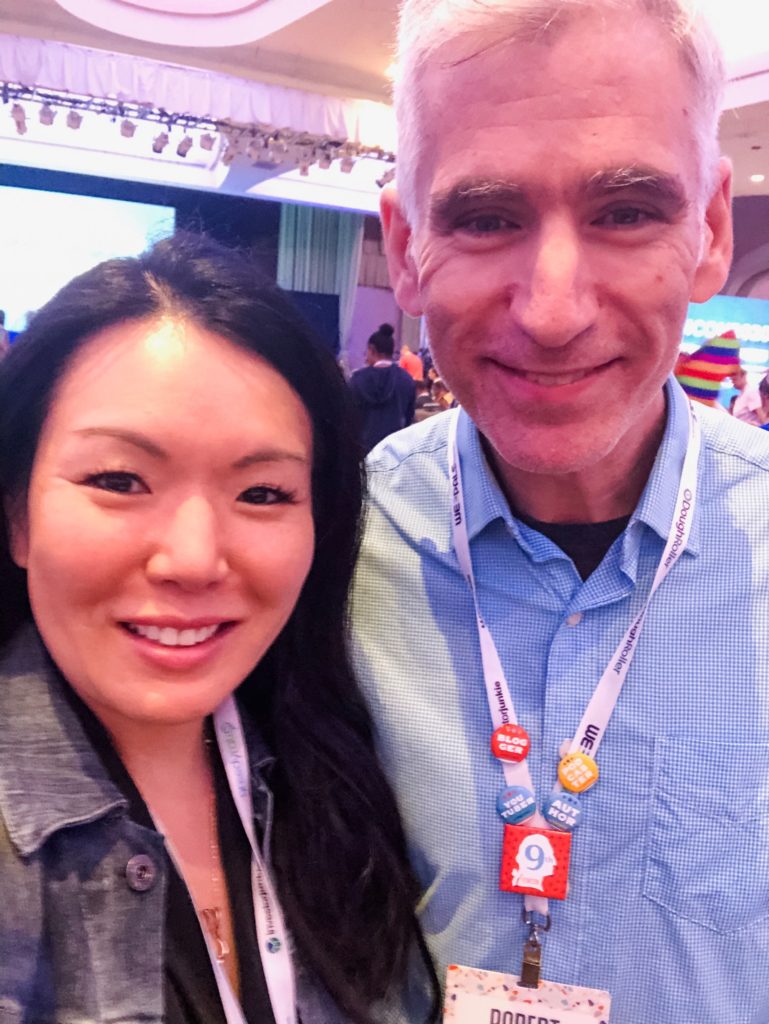
I also got to meet Rob Berger, the podcaster behind the Dough Roller Podcast –the first money podcast I ever listened to, back in 2014. He was gracious to take a selfie with me.
On top of that, I got to meet Emma Johnson of Single Wealthy Mommy. I love her message for single moms–that they can be wealthy financially, in love, and in life.
So like last year, here are some lessons I learned from #FinCon19:
Creating your team is probably the most challenging part of growing a business
Can I get an amen? You may not be running a business, but I’m betting many of you have had to hire a nanny or perhaps a personal assistant. A pearl I learned at FinCon is to take the stance that you are 100% responsible for their success or failure. It’s too easy to think it’s not your fault if they don’t deliver or meet your expectations since it takes you off the hook.
What if their success was all on you? I think we would all approach and show up for our team very differently. Never assume they know what you want or need. They also can’t read your mind.
Literally ask them to repeat back to you what you asked them to do.
Choose your friends and colleagues wisely
You may have heard the saying, “Your net worth is the average of the 5 people you spend the most time with.” I will take it a step further: you are limited in what you can do, accomplish, and make (money) in life by the people you spend the most time with. What do I mean exactly? If you spend time with negative nellies all the time, then you’re also probably a negative nellie too. You play it safe since that’s what all your friends do, too.
"You are limited in what you can do, accomplish, and make in life by the people you spend the most time with." Click To TweetOn the flip side, what if your friends all believed that anything was possible? What could be possible if your friends encouraged and supported your growth, whether it is personal or business growth?
This is exactly why folks in business join and continue to participate in masterminds. These are groups of like-minded people committed to growing their business by investing in personal and business development. We get together and openly share our secrets to success to help each other. A few of us got together at FinCon and had a “hot seat” where we each took turns asking for advice on a business problem. A mastermind is part advice, part rah rah, and 100% committed to cultivating a growth mindset.
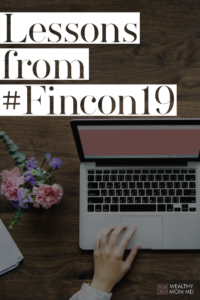
Let’s get rid of money shaming
Ramit Sethi gave one of the opening keynote talks at FinCon and boldly declared that there is no shame on spending a tremendous amount of money on things you love. I couldn’t agree more. And to take it a step further, though we are beginning to share the message of financial literacy to physicians, we are barely touching the subject of money shaming. There is a lack of money transparency and there is plenty of money judging going on. I’d love to see that end.
There is so much shame about how and on what we spend money. We are judged if we are perceived as having too much money. We celebrate paying off multiple 6 figures of debt, and yet we stay hush hush about reaching multiple 6 or 7 figures of net worth. Why?
There are only 3 answers: Yes, No, and Being Ignored
Cat Alford talked about “failure” in a way I haven’t heard before. In business (and in life), you often put yourself out there, whether it’s asking someone if you can collaborate on something or asking for someone to be a guest on your blog or podcast. Or, on the personal side of things, reaching out to a new friend or asking someone out!
Cat made it really simple: there are only 3 responses: yes, no, and being totally ignored. If you go in knowing that, it’s freeing. It really becomes a numbers game.
So instead of feeling bad when you get a no, or worse, no response, don’t take it personally. You got 1 of the 3 responses, so just keep putting yourself out there and you’ll eventually get the yeses that move the needle.
Final Thoughts:
So that was FinCon 2019! Of course I could go on and on, but those were my major takeaways. I always learn so much when I go there, and if you ever have an opportunity to attend, I highly recommend it! (Drop me a line so I can meet you there!)
In the meantime, if you’re interested in watching the speaker sessions from this year’s FinCon, check out this link and get access to tons of material from the conference at a fraction of the price! If you do take advantage of it, head over to the Wealthy Mom Physicians community and let me know what lessons you learned!
Read MoreEditor’s Note: This is a guest post from Ethan, my stepson who is currently 12 years old and in 7th grade.
Having Financial IQ is knowing how to handle money responsibly and save according to a plan. As a 12-year-old, I never thought I’d be introduced to this term. It has never been brought up in school and I didn't even know what it meant until my stepmom told me I needed to develop a Financial IQ.
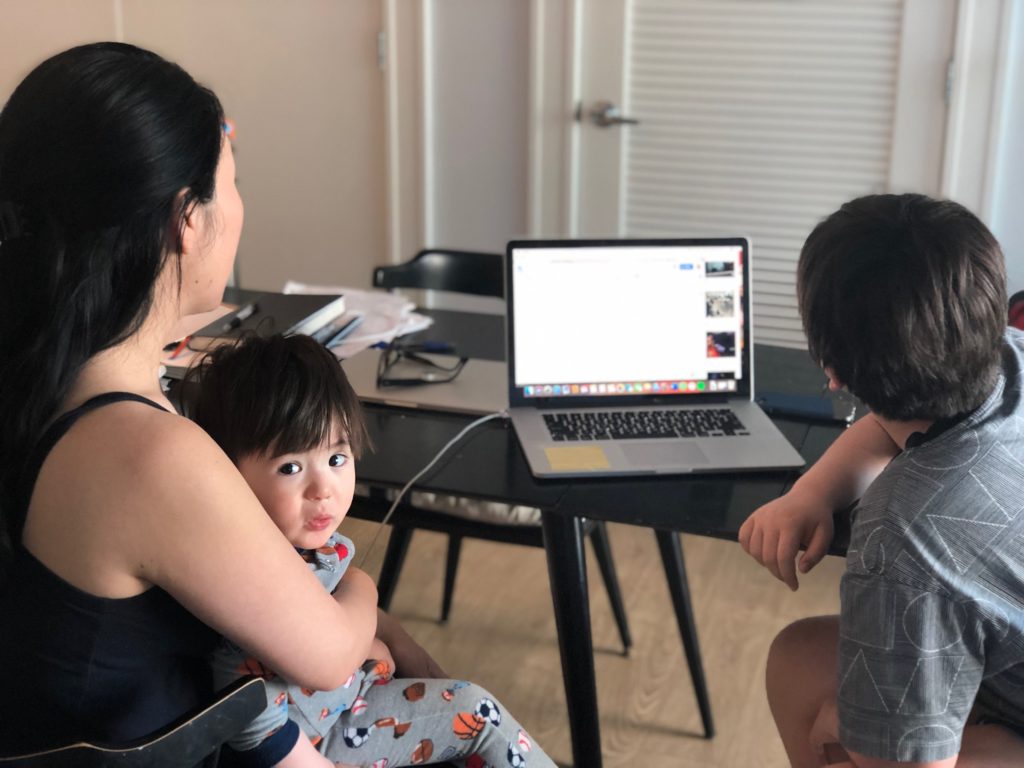
It is never too early to start learning about money. She gave me a copy of Rich Dad, Poor Dad to help me understand more about my Financial IQ and what it could mean.
Robert Kiyosaki, the author of Rich Dad, Poor Dad, started to learn at a young age and why it is crucial to develop your Financial IQ. The benefits of starting at a young age are that you will be able to understand more and more as you grow older. You will recognize opportunities such as:
- Acquiring assets that work and grow with you
- The ability to explore all the opportunities life presents to you. It’s not “I can’t afford it” but “How do I afford it?”
- Retiring early. I never thought about retiring, I mean I’m only 12… but I think if you are able to retire young, at like 40 or 50, then you can live a better, fuller life without the worries of money.
With that in mind, I am hoping (I’m 12, so cut me some slack) to write a series of posts over the next year on this book. Rich Dad says, ”Broke is temporary, poor is eternal.” He means that being rich is a mindset and the greatest asset is your brain.
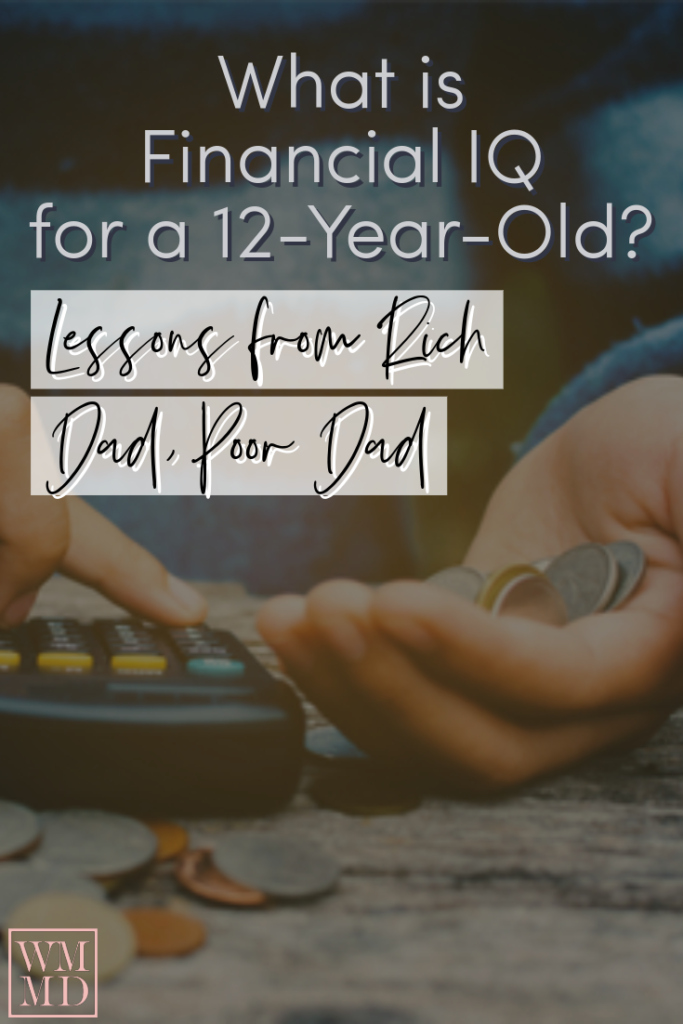
Simple Lesson One
Robert and Mike (who were best friends, and Mike was also the son of “Rich Dad,”) took jobs working for Mike’s dad at one of his bodegas. After several weeks of growing frustrations with little or no pay, Robert didn’t want to work anymore and was going to quit. Rich Dad said “I will not pay you,” so Mike and Robert had to find a way to make money.
At the comic place in their town, they were throwing out comics. Robert had an idea he asked if he could have the comics, and the store owner said yes as long as he did not sell them. So, he made a library and charged people $1 to read them to read as much as they want, and it is not selling so they did not break the deal.
Rich People Buy Luxuries Last
As a rich person, you have a lot of money, but you should not spend it on clothes. Spend it on assets to grow your money and then you will not have to worry about losing it because you will have a steady income and will not have to have to worry about finding a job or worry about losing your money. The rich know how to invest in assets–that’s why they’re rich. But the poor do not know how to invest in assets, and that's why the rich get richer and the poor get poorer, and the reason for Rich Dad is to educate the non-financially smart people and to get them to understand money.
Rich People Take Risks
Do not be afraid of taking risks when it comes to money. Rich Dad says that money is managed by fear with most people, and if you are scared of losing money than you could miss an opportunity to make even more money and become even more wealthy.
My friend is a bit of an entrepreneur. He buys trendy clothes and resells them for profit. Sometimes he makes no profit or even loses a bit of money. Resale is like the stock market.

What I Learned
My takeaway is that I did not know that money is living and breathing. It grows it shrinks and is sometimes unpredictable, but by teaching yourself about money, you can kind of make it work for you. Having knowledge about money is great because you learn and you make more money.
Do you think it is important to develop a financial IQ?
Why or why not?
Read MoreThis is a guest post by Alpha Investing, a private group of experienced investors with strong relationships with high-quality sponsors. Alpha Investing aggregates investments from its members into a syndicate and invests into sponsor projects – allowing members to access exclusive real estate projects at significantly reduced minimum investments. We have an affiliate partnership and I invest with them. Most of Alpha’s investment opportunities are common equity, but they do provide quarterly access to a commercial debt fund run by one of the oldest real estate families in NYC.
How Real Estate Debt Funds Work
Real estate debt funds help connect borrowers (often developers) with short-term capital for commercial real estate projects like multifamily buildings, shopping centers, construction loans, and many other property types. Real estate debt funds rose to prominence in the wake of the 2008 crash. Today, real estate debt funds occupy a small but profitable niche in the world of commercial real estate lending.
What is a Real Estate Debt Fund?
A real estate debt fund consists of private equity-backed capital that lends money to prospective real estate buyers or current owners of real estate assets. Investors in these funds receive periodic payments for the interest charged against loaned capital, and security charged against property assets, which takes the form of a mortgage. These funds offer loans collateralized by senior real estate assets to borrowers for a wide range of commercial and business real estate needs.
Most debt funds are focused on a particular loan strategy or investment idea. For example, some funds will focus on offering residential construction loans to multifamily apartment builders, while others might concentrate on financing retail and shopping developments. Other common loan types include industrial, construction, hospitality/hotel, and vacant land.
Which Borrowers Turn to Debt Funds for Capital?
Debt funds can offer commercial real estate borrowers loans and terms that traditional lenders cannot, or will not offer. They work with borrowers who have complex financial situations or do not have access to conventional credit for whatever reason. Some of the most common loan types include:
- Bridge Loans/Lease-Up Financing
- Construction Loans
- Property Rehab/Redevelopment Loans
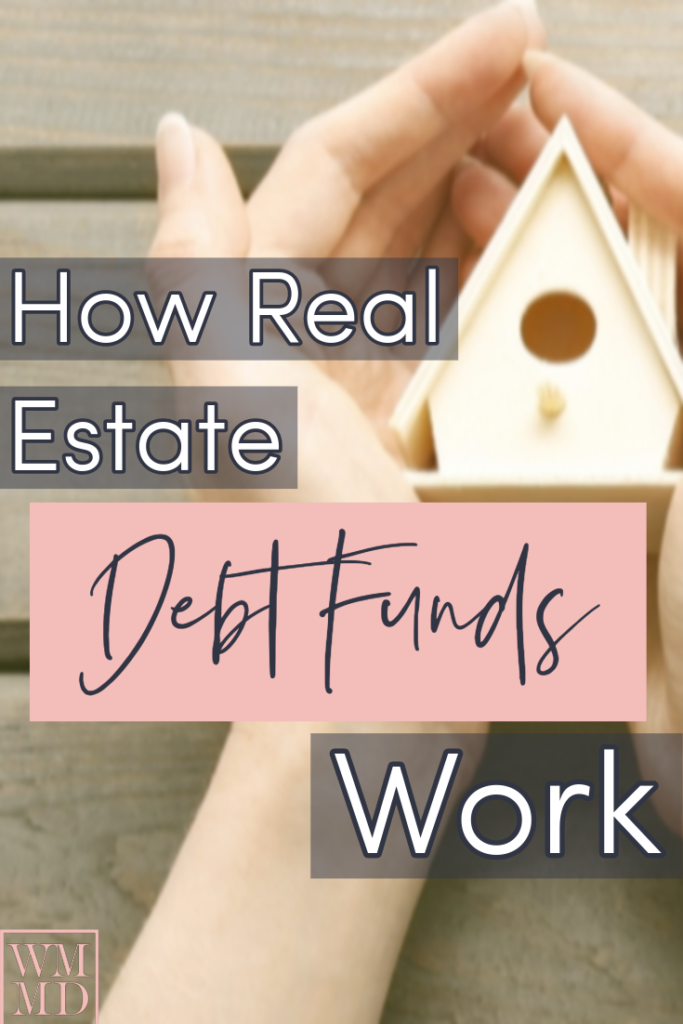
What Sets Real Estate Debt Funds Apart
Real estate debt funds first took off in the wake of the 2008 housing crisis. At the time, traditional lenders like banks were suffering from significant liquidity issues, and commercial real estate credit dried up. Many private lenders, including real estate debt funds, stepped into this gap and began lending to commercial real estate investors and businesses.
Although banks, agency, and Commercial Mortgage-Backed Securities (CMBS) lenders are again lending commercial capital, many traditional lenders have yet to go after borrowers in need of bridge or construction loans, leaving that sector mainly in the hands of debt funds and other private financing. Debt funds offer loans in the sweet spot where borrowers need amounts too large for small lenders and not large enough for non-bank institutional lenders, generally less than $100 million.
"Debt funds offer loans in the sweet spot where borrowers need amounts too large for small lenders and not large enough for non-bank institutional lenders" -Alpha Investing Click To TweetIf a business requires capital quickly, streamlined processes allow debt funds to meet their needs faster than a traditional lender. This nimbleness can be particularly beneficial in the real estate sphere, where tight closings are common and not securing funding in time can be disastrous. Owners and developers that lack the equity, or the balance sheet required by traditional lenders, or those requiring a higher loan to value (LTV) loan than a bank can offer may also turn to debt funds for financing.
How Real Estate Debt Funds Generate Income
Real estate funds generate most of their income through interest on borrowed capital and in the case of a default, obtaining title to the collateral underlying the loan. The fund charges borrowers interest rates often starting at 9%+, which can fluctuate based on market conditions. Payments on the loan are made monthly, and rates are fixed, or priced at a 30-day LIBOR plus spread, with a floor. Borrower fees for loans may include due diligence, origination, servicing, draw, modification, extension, or exit fees. Depending on the fund types, these non-interest-based fees may be distributed to investors in whole or in part.
Loan amounts can range from $5 million up to $150 million or more. They offer short-term loans, for example, between 1 and 3 years. The LTC (Loan To Cost ratio) or LTV (Loan To Value ratio) for loans is dependent on location, and the specific attributes of a property- for the most part, it is not greater than 80%.
As we mentioned earlier, in the case of default the fund may take possession of the title of the loan collateral. The fund may also look to restructure the terms of the loan with the borrower or sell the underlying note to another investor/lender. In each scenario, the lender's goal is to maximize the loans disposition value – taking into account cost and timing factors related to foreclosures and bankruptcies. With that said, the greatest upside lies in taking possession of properties that collateralize defaulted loans. Methods for increasing value differ but may include stabilizing, improving, or otherwise completing a property with the goal of achieving the highest disposition price in the shortest amount of time.
Summary
Real Estate Debt Funds occupy an important place in the commercial real estate finance markets. The industry has helped facilitate the construction and operations of thousands of properties across the United States and lent billions of dollars to investors and developers. Their ability to move quickly and their more accessible lending criteria make it likely that real estate debt funds will continue to occupy a critical place in the real estate markets.
Think of debt funds like the bonds of real estate vs. buying property (the stocks or equity equivalent). An accredited investor can buy into a debt fund. Keep in mind that debt fund payouts are taxed at ordinary income rates and that commercial real estate debt is not as predictable as corporate or government bonds. A great way to tax shelter this is to place your debt fund investment into a self-directed IRA. This is just a regular IRA that allows you to invest in alternative investments besides the typical stocks and bonds. The popular custodians like Vanguard and Fidelity do not offer these.
Read MoreEditor’s Note: This is a guest post by a fellow Wealthy Mom MD that goes by the alias Hatton 1 in the online world. This female physician is the blogger behind doctoroffinancemd.com and now part-time GYN who has achieved Financial Independence.
Miss Bonnie asked me to provide some pearls for achieving financial independence. Who am I? Why am I qualified to give advice? I am a prolific poster on the White Coat Investor forum. If I was saying stupid things I would have been shot down a long time ago. I also run a blog called DoctorofFinanceMd.com. My main qualification is that I have been FI for years. I am OB/GYN. I was able to stop delivering babies about 5 years ago and do GYN part-time.
The younger you have your “AHA MOMENT” and start paying attention to money and finance the easier your journey will be.
The only real difference between finances now and when I went to medical school/residency is the student loan burden. I would add that salaries are inflation-adjusted much higher now immediately out of residency to partially compensate for this. I think learning every detail about your loans and different payback possibilities is incredibly important these days. I also think when you are a resident you need to live like one and minimize living expenses that you are borrowing!
Do not buy a house when you are a medical student, resident, or new attending!
I know you want one. This is one of the biggest mistakes you can make financially. It is really dumb if you have $500k of student loans. You will find in life that there is always someone who will loan you money when you have MD (or DO) after your name. You have to continue to delay gratification if you want to achieve FI. If you are young you may not yet realize that your first job is likely not forever. It really complicates your life when you are contemplating a job change. I know this because I bought a house as a new attending. I was lucky to sell it quickly but it was luck and I made no money on the deal. The rule of thumb is not to buy unless you plan to be there for 5 years.
"You will find in life that there is always someone who will loan you money when you have MD (or DO) after your name. You have to continue to delay gratification if you want to achieve FI." Click To TweetThe smartest thing that I ever did was front-loading my retirement investments.
What do I mean? I filled up my retirement space early every year then I dumped lots of money into a taxable account. I started doing this at 31. By 45, I was working 3.5 days per week and paid off my house. The key principle is funding your accounts at a young age so you can benefit from compounding. A taxable account is very flexible. You can put anything you want in it. You can access it at any age. You need some level of self-discipline to not raid it, however.
Whatever type of retirement investments are available to you is what you need to learn about. Become an expert on your accounts. Quit worrying about stuff that does not apply to your situation. For example, I know I cannot do a backdoor Roth IRA contribution because I have a large SEP/IRA. I do not want to pay a large amount of pro-rata rule taxes so I do not stress over the steps to do a backdoor Roth.
Choose what you worry about.
Life insurance (if you have dependents), disability insurance, and umbrella insurance all are very important. Quit worrying about losing a malpractice case greater than your policy limits.

Be very careful about associating with Doctor Jones.
Who you associate with can really derail your path to FI. I would recommend reading The Millionaire Next Door series of books and thinking about them. Decide what is important to you. I see a lot of doctors derail their personal finances when they start trying to keep up with other very wealthy families they meet either at a country club or private school. You can do these things but just be careful.
I personally do not invest in crowdfunded real estate, apartment buildings, bitcoin, timber, gold, silver, hard money loans, leveraged ETFs, VIX, or “angel” investments.
I invest in stocks, bonds, REITs, and MMFs. Boring. Investing should be BORING. Over time boring investments will make you kinda rich. Guess what I am doing in about 10 days? I am paying cash for a house. If you follow my advice you can also.
Note: In this post I got a bit behind the scenes here at Wealthy Mom MD. I hope you enjoy it!
Earlier this year I discussed my 5 productivity tips. I’m always up for learning how to be more productive. After FINCON18, I decided I was going to take my business to the next level–while still working close to full time as a dermatologist, being a mom to Jack, and a fiancee to Matt. And I still wanted “me” time, too–seeing friends, working out, etc.
Unfortunately, I don’t have the ability to create time, so I knew I’d have to learn how to juggle all of these things and hope to still feel sane.
First, is it really possible? YES.
I was initially inspired by The Life Coach School’s podcast episode Throw Away Your To-Do List. Brooke Castillo knocked down the all-pervasive notion that you must be busy in order to be successful or “get sh*it done.”
In reality, “busier” people are simply sloppy with their time management and there is no direct correlation with how successful one is and how much time they have available.
Brooke Castillo
I knew this was going to be an amazing episode when she said that. In fact, Brooke “works” 3 x 6hr days and earns a multiple 7-figure income. I’d like for you to challenge the belief that working hard and putting time in equates money or success. It doesn’t.
Soon after, I discovered Michael Hyatt’s new book, Free to Focus. Michael, like Brooke, challenges the idea that productivity is NOT about finding or saving time. Productivity is about working less AND having more free time. Can I get an AMEN?
But wait, you may say. I have LOTS of stuff I need to do. Do you? Michael challenges us further by saying that all things are a choice and you can choose not to do something.
Here are a few things I’ve started implementing in my own life and business in order to work less and have more free time:
Batching
This is a powerful tool I just recently learned.
What is batching?
Batching is when you work on similar tasks or projects in one, long, uninterrupted swatch of time. One popular example is batch cooking on the weekends so you have pre-prepped meals or ingredients for the week. I know some folks batch cook for the month by preparing freezer meals.
Why is batching this effective? It minimizes task switching. Every time you switch tasks–aka multitask–you lose up to 40% productivity. It gets worse. It’s been proven to increase stress and anxiety, kill creativity, drain your brain of precious resources, and effectively reduce your IQ to that of an 8-year-old.
You may think you’re good at multitasking–checking emails, responding to texts, and working on a paper all at the same time–but no one is.
I’ve implemented the batching method in my business by batch-writing content (blog posts), my weekly emails, and my social media. Instead of scrambling the night before to write something for my blog, it’s been planned and batch-written at least a month ahead of time. I hope to increase that to 3 months ahead of time soon.
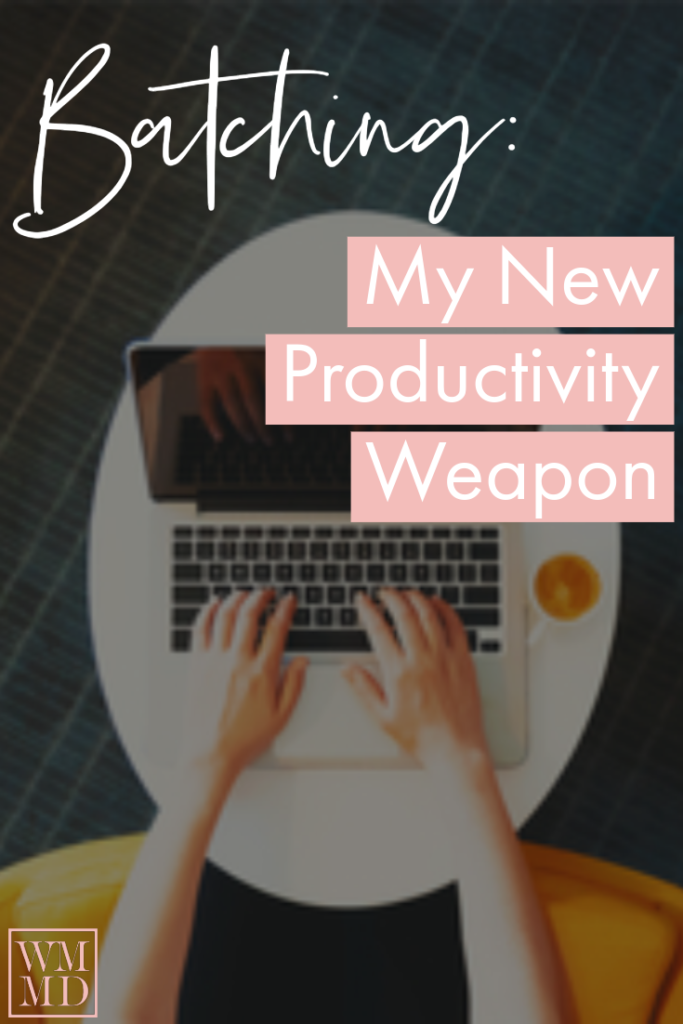
Schedule Checking Your Email (and Other Forms of Distraction)
How many notifications and beeps come from your phone everyday? Or your computer? (Every website now seems to want the ability to notify you…) You may think it’s no big deal when your phone beeps or vibrates. However, it’s been proven to increase your anxiety and the only way to relieve it is to check your phone.
High performers are not at the mercy of their devices. They schedule specific times to check email and may even minimize checking their phone for text messages.
Batching is powerful if you stay focused on the tasks at hand. You may have to turn off internet access while doing your work. The classic “let me check what’s happening on Facebook” scenario where, one hour later, you forgot what you’re working on. We’ve all been there.
Ideally, I’ll check my email twice a day and address them to reach Inbox 0. I turn my phone to silent and put it out of sight when I’m in batch mode.
In reality, “busier” people are simply sloppy with their time management and there is no direct correlation with how successful one is and how much time they have available. @BrookeCastillo Click To TweetOutsource
I’ve always been a huge fan of outsourcing. As the content creator of my business, it is not a good use of my time to do things like approving members to my Facebook group, edit and upload blog posts to Wordpress, or schedule social media content. I know how to do all of these things and did all of this for a long time, but a time comes when it is no longer a good use of your time and will hinder your business.
It’s just like how you don’t room your patients or check them into your office. What other things in your life (or business) should you no longer do? Learning how to delegate tasks and ensure quality are skills you can learn.
Schedule YOUR Time First
Most people schedule their days or weeks by scheduling their work or other “must do” items before scheduling “fun” time or family time, or whatever their personal priority is. Then they wonder why they never make it to the gym or see their friends.
Schedule these things FIRST! And protect this time! Just like you’d never schedule a friend date in the middle of your clinic, (you wouldn’t even entertain that, right?) you need to schedule and protect your time as well.
Mondays to Fridays 5pm-8pm is my protected family time. Jack goes to bed at 8pm. During those hours, I do my best to put my phone aside and be with my family.
Just Say No
“The difference between successful people and really successful people is that really successful people say no to almost everything.”
Warren Buffet
You don’t have to say yes to everything you’re asked to do. In fact, if you want to be more productive and have more free time, you need to learn how to say no. If you’re a really nice and helpful person, this can be difficult to do. But saying yes to everything you’re asked can lead to you overbooking yourself and stressing out, which will hurt your productivity overall.
Learn how to say no, especially when the things you’re asked to do cut into your family time, personal time, or time you planned to spend batching. That way, when you are able to help someone, it won’t be stressful or counterproductive.
Read MoreI love attending conferences! And not just CME conferences for dermatology (love those too.) They foster personal development and growth and I get to meet like-minded people and make new friends.
Earlier this year I attended two conferences:
Maui Derm – January 26-30, 2019
Grand Wailea, Maui, Hawaii
If I’m going to get some CME I may as well do it in Hawaii! This was a great excuse to get some old derm girlfriends together without our spouses and kids! I’ve now officially attended all three Hawaii Dermatology conferences (the others are Winter Clinical and Hawaii Derm).
Of course, any CME trip is tax-deductible or eligible for reimbursement from your employer (if they do that). I like combining these trips with vacation to minimize my vacation spending. After Maui, I went to Honolulu for a few days to see some friends. I used Chase Sapphire Reserve points for my flights to Hawaii. And most of the rest of the trip (besides Honolulu) is a business expense.

Impact Summit by Kajabi – April 5-7, 2019
Irvine, California
Impact Summit is a conference for online entrepreneurs. This was the inaugural conference by Kajabi and to say it was FUN is an understatement. I think sometimes as physicians, we forget what else, and who else is out there – we are often in a bubble of other physicians. Here I met a few hundred online entrepreneurs and got to see some of the top online entrepreneurs speak such as Amy Porterfield, Rachel Hollis, Jasmine Star, James Wedmore and Brendon Bouchard.
In case you’re not familiar, Kajabi is an “all-in-one” online platform where you can host and create your website, email list, run your online course, membership sites and more. What I love about Kajabi is that they continually update and improve their product and provide excellent customer support. I use Kajabi for my opt-ins, sales pages, online course, future membership site and email list.
And here are the conferences I will be attending or speaking at through Spring 2020. I love meeting new people, so let me know if you’ll be there too!
FinCon – September 4-7, 2019
Washington, D.C.
FinCon is a conference for financial bloggers, financial advisors and industry to connect and exchange ideas. There’s been a growing group of physician finance bloggers and we tend to meet at FinCon. Although there are numerous sessions on how to improve your outreach as a blogger, most of us attend to network and meet others in the industry. Like I said earlier, I love meeting people and it’s pretty awesome to meet others who love the topic of money as much as I do!
Like last year there will be a dinner for physician finance bloggers, so get in touch if you’d like to attend!
Brave Enough Conference – September 12-15, 2019
Scottsdale, Arizona
BE19 is the third annual conference by woman physician Sasha Shilcutt, MD. Many women physicians find themselves isolated, especially after they become mothers. It’s all too easy to lose connection let alone make time for ourselves. BE is all about reconnecting with ourselves and empowering women physicians.
Here, you can show up whoever and however, you are. Come and meet your fellow women physicians from all specialties! I am thrilled to be a speaker at BE19 where I will discuss “The Keys to Wealth.”

The Entrepreneur Experience – October 17-19, 2019
Coronado, San Diego, California
Have I mentioned how much I love Amy Porterfield? She’s an online entrepreneur who teaches other online entrepreneurs how to create and sell their online courses. I’ve learned a lot from her and she was a huge part in helping me launch my first online course earlier this year.
She hosts an annual conference for her course takers and I can’t wait to hopefully meet her and get inspired by meeting other online entrepreneurs. Matt will be attending with me.
Passive Income MD Real Estate Conference – October 26, 2019
Los Angeles, California
You heard it here first! Get ready for the first real estate conference geared towards physicians with Peter Kim, MD aka Passive Income MD. I’m excited to learn more about real estate from Dr. Kim and the duo behind SemiRetiredMD.com.
Empowering Women Physicians Retreat – December 2-7, 2019
How about some CME, life coaching AND amazing bucket list destination? Yup, a CME retreat for women physicians in Bora Bora!
Four Seasons, Bora Bora, French Polynesia
Dr. Sunny Smith is a life coach and physician who coaches women physicians. She’s also my coach. I’ve had my best year yet so far and a large part is due to having her as my coach. For those of you that are not familiar with what a life coach does – in short – their job is to help you get yourself out of the way so that you can get the results you want. They help you become the best version of yourself!

Women Physicians Wellness Conference – February 25-27, 2020
Grand Cayman, Cayman Islands
Dr. Erica Howe created this conference out of a love for helping and educating women physicians and the Cayman Islands. I’m honored to be a speaker at her conference along with some amazing women physician leaders of our time… in Grand Cayman. Not too shabby! We plan to take the whole family with us to this one!
I can get used to these beach destinations that also offer CME!
Physician Wellness and Financial Literacy Conference – March 12-14, 2020
Paris Hotel, Las Vegas, Nevada
Aka WCICON20 this is the second White Coat Investor conference. The first one in 2018 sold out very quickly and was in Park City, Utah during ski season. In order to accommodate a larger group, the conference is now in Las Vegas! I’ll admit Vegas is not my favorite conference destination.
Like the first one there will be a wide range of speakers and panels including one for Women Physicians that I will be moderating. I’ll be hosting a reception for women attendees as well. Date and location TBD.
Registration opened earlier this week so be sure to register if you want to attend!
Will you be attending any amazing conferences this coming year? Drop me a line!
Read MoreThis is a guest post by fellow physician blogger known as Crispy Doc. He is a financially independent emergency physician, married with kids, and lives in coastal California. He blogs about financial literacy and burnout at www.crispydoc.com. He tweets, too: @crispydocblog.
A recent conversation with a financially brilliant friend led to the revelation that in addition to the usual suspects (health insurance before Medicare kicks in, Sequence Of Returns Risk), inflation remains a very real worry for those considering early retirement.
Inflation is the erosion of purchasing power over time. It's averaged 2-3% per year in recent history, although there have been notable years (1974 and 1980) where it exceeded 12%.
While the risk that inflation poses is far less than that posed by Sequence of Returns Risk (SORR). SORR is the risk that investment returns from your portfolio in the early years will be so low you run out of money before you have died. More about that later on…
Mattresses possess two major risks: conception and inflation
Conceiving an unplanned child on a mattress can undermine one's retirement plans as surely as inflation, but I'll conveniently exclude that topic from today's discussion to focus on the second mattress risk.
Keep a dollar in your wallet to spend later that evening, and your dollar does the job nicely. Keep that same dollar under your mattress for years and when you take it out, it buys less.
In a highly recommended series written by bloggers Big ERN and Actuary on FIRE, they describe how $1 million that remains un-invested (under the mattress) subjected to 2% annual inflation for 25 years will have the purchasing power of $600k at the end of that period.
This is understandably scary for an early retiree counting on that stash but equally fearful of market volatility.
Cash under your mattress will not suffice. You need to invest your dollar where it can keep pace with inflation or beat it. [Editor’s note: I like to call this – make your money work for you! Don’t let your green employees be lazy!]
Take home point: Cash is great in the short-term, lousy over the long run.
Cash is great in the short-term, lousy over the long run. @crispydocblog Click To TweetSh*t's about to get real: a note on terminology
When considering portfolio returns, it's important to understand the difference between real and nominal returns.
The amount your portfolio earns above and beyond inflation is termed your real return.
In contrast, nominal returns do not subtract inflation.
This is a critically important difference. During the great recession of 2007, investors seeking safety purchased government treasury bonds with nominal returns below inflation. These treasuries had negative real returns – investors actually lost money on these investments!
What investment tools can we deploy in our inflation-fighting toolkit?
Our investment toolkit includes equity (stocks) and fixed income (bonds, treasuries).
Stocks represent an ownership stake in a company, with the potential to gain or lose value as the company grows or fails.
Bonds are loans to a company repaid at a fixed interest rate.
Treasuries are loans to the government.
Equity
Stocks are higher risk, higher reward. Bonds are lower risk, lower reward.
Stocks historically beat inflation in the long term, but at the risk of greater volatility in the short term. Throw a dollar in stocks for 30 years and you are extremely likely to come out ahead of inflation at the end of the time period.
Throw a dollar in stocks for 30 months and it's anyone's guess if you'll win or lose. The loss could be half the value your dollar.
Take home point: Only dollars that you can ignore for decades ought to go in stocks, but the expected growth should exceed inflation over the long haul.
Fixed Income
Fixed income investments like bonds offer a slow and steady return on investment that keeps pace with or just beats inflation. Money you'll need in the next several years belongs in fixed income.
In fact, many investors create bond ladders – for example, they may invest in bonds that mature sequentially one year apart staggered over a decade. This keeps their investments liquid to ensure the money becomes available just in time to meet their spending needs, or alternately, can ensure they don't tie up all their money in a less remunerative bond if rates rise over that decade.
Fixed income investments are not, however, risk-free. The credit risk of a bond is that the issuer will go bankrupt before you are paid.
Interest rate risk is the risk that when interest rates go up, the bond you own will decrease in value because investors can obtain a higher rate of return elsewhere.
Take home point: Bonds tend to beat inflation, with lower risk than stocks. They not only reduce the volatility of your investment portfolio, but are a safer place to park money you are counting on in the coming decade.

Treasuries
The United States has created a solution to credit risk by issuing Treasuries (government-issued bonds). Since the government can always print money, it is felt not to be at risk of bankruptcy (This works well in the U.S.; not so much in Zimbabwe and other unstable countries where no one assumes the government will survive the year).
Take home point: Treasuries are considered to be completely free of credit risk but remain subject to interest rate risk.
Feeling TIPSy?
Uncle Sam has deep pockets, and you are his favorite niece. For this reason, the government has created a flavor of treasuries called Treasury Inflation-Protected Securities (TIPS), whose value increase is proportional to inflation.
Returning to the example from Big ERN and Actuary on FIRE, if you were to invest $1 million in TIPS subjected to 2% annual inflation for 25 years, you will withdraw an amount that preserves the full purchasing power of your $1 million at the end of that period.
But Uncle Sam is also a tough love uncle. If deflation occurs, the value of your investment drops proportionally.
Take home point: Invest in TIPS to protect against a jump in the inflation rate, so a dollar invested will retain full purchasing power at the time of withdrawal. The flip side is they can lose value in times of deflation.
How You Can Use These Tools To Protect Yourself At Retirement
In retirement, you are dealing with a new reality. Earned income from work has ceased, and you are living on a fixed income going forward that comes from your investment portfolio. Your goals are:
- Guarantee we have enough to cover the initial years of retirement in a worst-case scenario such as poor sequence of returns.
- Reduce the risk we take by increasing our bond allocation and reducing our stock allocation at the time of retirement.
- Minimize the risk inflation poses to our portfolio.
- Maintain a safe withdrawal rate low enough to last you until death.
One reasonable plan that incorporates these goals might be:
Maintain cash equivalents for the first 3 years of retirement. Year one should be cash in a money market account that gets transferred monthly into your checking account, years two and three can be invested in short-term CDs until you need to tap them for expenses.
Gradually shift asset allocation at retirement to increase fixed income since you can no longer risk the volatility of stocks. Let's say you are currently 70/30 stocks to bonds – a great recession striking the year after you retire could result in a loss of 35% of your portfolio, exactly when you lack the long time horizon to patiently wait for it to recover since you'll be living off of that portfolio. This is the dreaded SORR.
At retirement, you might go 50/50 (limiting your potential stock losses to 25%). Once past that critical first decade after retirement, you can consider upping your stock allocation gradually because you've made it beyond the most potentially devastating period when a sequence of returns risk could sink your retirement ship.
Another response to SORR is to remain flexible. If you can reduce your expenses when annual returns are low, you remain in a position of power.
Consider splitting your fixed-income investments evenly between bonds and TIPS, as TIPS will help you hedge against inflation risk. (The Vanguard Target Retirement Funds tend to split fixed income roughly 1/3 TIPS, 2/3 bonds at the time of retirement, for comparison.)
Finally, despite the FIRE community's general adoption of the 4% safe withdrawal rate, a more conservative 3-3.5% withdrawal rate will inevitably provide a buffer of safety that lets you sleep more soundly at night. This is doubly important for the early retiree, since the 4% safe withdrawal rate in the original Trinity Study was designed to survive a 30 year time horizon and many seeking FIRE will need their portfolios to last decades longer.
As Dr. William Bernstein has so eloquently put it, “The purpose of investing is not to simply optimize returns and make yourself rich. The purpose is not to die poor.”
With a better understanding of the investing tools in your tool belt, you will be less likely to need to tighten that belt in retirement!
Read MoreAfter months of being busy, I was finally able to catch up with my friend and collaborator Carrie Reynolds on her podcast, Hippocratic Hustle! I got to share my upcoming life changes–moving, quitting my job, all that crazy stuff! As of now, I have about 1 more week of work, and then we pack up everything and move back to the NYC area. I talk about what I’m planning to do with the rest of this year, including my decision to do Locums!
Also, I was able to talk about my website’s rebrand from Miss Bonnie MD to Wealthy Mom MD–why I rebranded, how I chose the name, and how I went about redesigning the website. Since it’s been live for a while, I’m sure most of you are now familiar with the new design, and I hope you like it as much as I do!

We also had a chance to talk about charities–Hippocratic Hustle’s foundation and my own plans to set up a Wealthy Mom MD foundation someday soon. I’m still in the process of doing research, but I’m excited to find a cause and start giving back!
Listen to all this and more by following this link!
Wealthy Mom MD is all about empowering women physicians. In today’s society, women are entering the workplace more and more, building their own careers, and becoming the breadwinners of their households. But have we reached gender equity in our financial and professional lives?
This is a big question, and one I had the privilege of discussing on What's Up Next, a financial freedom podcast hosted by Paul Thompson and Doc G. Joining me in the guest panel were fellow women physicians and financial experts Erin Lowry, author of Broke Millennial and brokemillenial.com, and Carrie Reynolds, host of the Hippocratic Hustle podcast.

Many women in the professional world also double as wives and mothers. Some of us make more money than our spouses or partners. In the podcast, we talk about what this is like and whether or not there’s a power dynamic at play. We also discuss how to balance our professional lives with our personal lives, which includes redefining gender roles and/or outsourcing help.
"I think the professional woman of today sometimes feels like she has to be superwoman and mommy-guilt is a big part of it." Click To TweetWomen shouldn’t feel the need to do everything – it’s all about finding balance!
In the end, the question that begins the podcast still remains: have we reached gender equity between men and women? The consensus seems to be “not really,” but it doesn’t mean there haven’t been improvements. If anything, as long as we keep having these discussions and as long as women continue to feel empowered to reach their goals and redefine the gender norms of the home and the workplace, things will only continue to get better!











